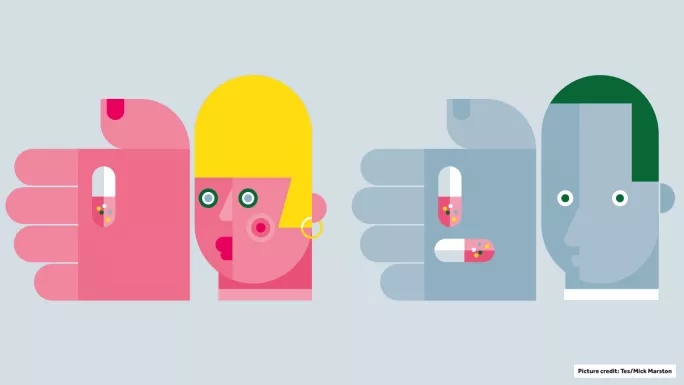Are your pupils taking smart drugs?

Jane is worried. It’s not long now until the exams and there’s still a stack of revision to get through. Everyone says the new GCSEs are harder than ever before, but all of Jane’s friends are still aiming for top grades. She’s struggling to keep up the pace.
So she stays up later and later into the night, poring over her books and willing the stuff to stay in her tired head.
Then, one day at lunch, Jane’s boyfriend tells her about these smart pills he bought off the internet - a couple of quid a pop - that make you feel like you can learn anything.
Fearful of falling even further behind, Jane decides to give them a go...
You’ve probably heard of smart drugs, but you might not know what, exactly, they are. The term is used to describe a collection of drugs known as “cognitive enhancers”. Many of these drugs are usually prescribed for conditions such as ADHD and narcolepsy, but people without those conditions believe they still get a benefit from them, be it in the form of improved memory, motivation or executive function.
Over the past few years, there have been several well-publicised predictions of an “explosion” of smart drug use by university students. And surveys suggest anywhere between 7 and 38 per cent of adults have illicitly used these drugs, which include Ritalin, Adderall and modafinil (see box, right). In fact, it has been estimated that up to 90 per cent of the use of modafinil - a stimulant that is usually prescribed for people suffering from narcolepsy - is actually off-label use by healthy people seeking a brain boost.
“In general, we’re seeing an increase in lifestyle use of smart drugs by healthy people, such as university students and city workers,” confirms Barbara Sahakian, professor of clinical neuropsychology at the University of Cambridge, who is researching the psychological and ethical impacts of these “cognitive enhancers”.
With prominent use among older age groups, use among at least some school-age students was inevitable, and most experts in this area believe a small but significant number of teens have turned to smart drugs. “We live in a knowledge economy, so if you’re trying to use your mind to advance yourself - to get into the best universities or a competitive job - it’s not surprising to find a high usage in those areas,” says Sahakian.
The fear of the researchers is not just that, faced with ever-increasing exam pressure and easy dealing from peers or the internet, teens are using these drugs - it is also that their use will now spread. Peer influence is a big factor in people taking the drugs in the first place.
Teachers and parents, they believe, need to get clued-up fast.
So, what, exactly, do smart drugs do? How dangerous might smart drug use be? And what, if anything, should teachers be doing about it?
Smart drugs are chemicals that enhance the cognitive functions of the brain: they have been described in the past as being a balancing agent to “optimise” brain performance. For those with ADHD or narcolepsy, the positive impact of these drugs has been proven - they do help with the challenges those conditions cause - but their impact on people without a prescription is unclear.
“These drugs definitely work for the conditions that they are prescribed for,” reveals Dr Suzi Gage, a psychologist and epidemiologist at the University of Liverpool and co-host of the award-winning Say Why to Drugs podcast. “But what we don’t know is, if you’re already functioning at a ‘normal’ level - for want of a better word - will they improve you beyond that? For example, we know that anti-depressants don’t seem to have an impact on people who aren’t already depressed, and painkillers won’t help you if you’re not in pain.
Brain boost
Fans of cognitive enhancers like to use the analogy of a calculator to describe their benefits. Sure, you can do mental arithmetic in your head, but a calculator enables you to tackle more challenging and interesting manipulations. On smart drugs, your brain becomes the calculator.
Others counter that the drugs may actually act more like glasses or crutches - helpful for people who need them, but a hindrance for those with 20:20 vision or fully functional limbs.
Unfortunately, as Gage says, we simply don’t know which of these views is correct. To try to find out, Gage and her colleague Dr Carl Roberts are carrying out a combined analysis of studies that have looked at the impact of smart drugs on performance and cognition in healthy populations, rather than in those who are taking them for a diagnosed medical condition.
They’re focusing on high-quality placebo-controlled trials looking at single doses of Adderall, Ritalin or modafinil, usually involving relatively small numbers of volunteers. By combining all the data together in a meta-analysis, they hope to see whether there is any evidence for a consistent effect on cognition, task performance or memory.
One such study has been run by Sahakian and her team at Cambridge, who have tested the effects of a one-off dose of modafinil in a placebo-controlled double-blind trial - the “gold standard” for clinical research. Not only did they find a small but significant boost in some tasks, particularly involving planning and memory, they also found that people taking the drug enjoyed the work more.
“The people taking the placebo find the tests quite interesting so they give them a little bit of rating for enjoyment and pleasure, but on modafinil they find them very pleasurable,” says Sahakian. “We think these drugs enhance task-related motivation. They make things that you’ve been putting off that you don’t really enjoy very much seem more enjoyable, such as studying for exams or writing a very long essay. It’s not the same kind of pleasure you’d get from a recreational drug and it’s not a magic knowledge pill - you still have to do the work - but it just makes the task seem easier to get into and more enjoyable when they do it.”

Other studies have shown a range of results for various cognitive enhancers, with some research finding that while the drugs seem to improve performance on certain types of intellectual task, they appear to reduce other aspects, such as creative thinking.
But, as Gage and Roberts are finding as they assemble the data for their analysis, it’s difficult to know how well these one-off studies reflect how cognitive enhancers are being used in the real world outside of the research lab.
“Surveys that report the prevalence of use just ask people whether they have ever taken them, but this is meaningless - you could have tried it once or you could be taking it every day for your entire three years of university, which is going to be an entirely different risk profile,” Gage says. “It’s all well and good doing a study of single doses where you’ve got everything controlled, but unless people are actually using them in the same way as your trial participants, then what is it really telling you?”
What the researchers are clearer on is whether smart drugs are dangerous. Adderall, Ritalin and modafinil are broadly well-tolerated and safe to use, although only in the context of treating medical conditions where the benefits outweigh the risks. Much less is known about newer drugs such as racetams or the broader impact of cognitive enhancers on children without a formal medical diagnosis, so it’s ill-advised to take them without medical supervision.
For example, modafinil can interfere with hormonal contraceptives such as the pill, risking unintended pregnancy for sexually active girls who are also taking the drug (bit.ly/NiceMod), while studies suggest that amphetamines such as Adderall can be risky for people with pre-existing heart conditions (bit.ly/AddRisk).
Black market
Then there’s the issue of legality. While it’s legal to buy smart drugs in the UK, it’s illegal to supply them. According to anecdotal evidence, some users will buy pills from friends or classmates with legitimate prescriptions, depriving them of treatment they need. Others are prepared to fake symptoms in search of a prescription of their own, leaving a trail of false information in their medical history.
Even more turn to the internet, which leads prospective users into dark corners where dodgy dealers and counterfeit drugs lurk. The UK Medicines and Healthcare Products Regulatory Agency (MHRA) shuts down thousands of websites selling smart drugs every year, and investigators have seized illegal shipments worth hundreds of thousands of pounds. Many of these drugs come from China, Russia or India, and there’s no guarantee that they actually contain what is claimed on the label, putting users at risk of being ripped off or suffering serious harm.
So the benefits are unproven and the risks can be significant, but, as mentioned earlier, plenty of people still decide to take smart drugs. How many of them are children in your school?
That’s a very tricky question to answer. Surveys reveal that anywhere between 7 and 20 per cent of university students in the UK, US and Switzerland have taken cognitive enhancers at least once, and in an anonymous poll by New Scientist and BBC’s Newsnight, nearly 40 per cent of respondents confessed to trying them.
But while there are plenty of anecdotes about the use of smart drugs in schools - particularly on internet forums such as Reddit - there is virtually no data, owing to the challenges of gathering this kind of sensitive information from children. However, every researcher who we spoke to for this article was sure that at least some under-16s are using them, based on growing use among adults and anecdotal evidence.
“Anywhere between 5 and 30 per cent is a safe bet,” argues Magen Inon, a secondary school teacher who is also studying for a PhD at UCL Institute of Education and is doing research in this area. “My feeling is that more and more children are using them, as well as adults, but exact numbers are hard to find.”

If there is significant usage among school pupils, then there is a danger that the numbers of users will increase, because peer pressure is believed to be a significant factor in taking the drugs.
“I’ve had students tell me they don’t really want to use these drugs,” says Sahakian, “but when it comes to exam time, they see people passing them around in the library and feel pressure to take them, because they don’t want to feel like they’re at a disadvantage.”
Gage says she has found evidence of the same, despite it not making any real sense to think this way.
“There have been surveys where students say it’s an unfair advantage if people are taking smart drugs, but where do you draw the line?” she adds. “Coffee is a mild stimulant and a cognitive enhancer, so should we stop students from having a coffee before they go to their exams or do their revision?”
But some argue that the system itself is pushing children towards seeking any advantage they can. Inon is particularly interested in this.
“If you’re only measuring academic performance then using these kinds of drugs makes sense because they aid that performance,” he says. “The debate around drugs brings up the issue of what is the purpose of school: why do we find academic performance so important that kids are willing to take drugs so they will perform better? Academic performance is an important aim, but it’s not the only one. And it shouldn’t be the only criterion for a good teacher or a good school.”
Upping the competition
These questions - and the debate about smart drugs in general - will become increasingly important in schools because there are companies developing pills with the sole aim of cognitive enhancement. If they prove effective and are made legal, it will force Inon’s queries to the fore and raise other issues, too.
For example: there’s the question of who should get access to them. Wealthier families may be happy to pay for a chemical boost, but this risks reinforcing the social inequalities that already put poorer children at a disadvantage when it comes to fulfilling their academic potential.
“Our current education system is very competitive, so if you want to get into a good university you need to perform better than other people in your exams,” Inon says. “If everyone takes these drugs then everyone will move a step up, but the differences between them will still remain. We have to ask how competitive we want our school system and our students to be - can everyone be a winner? And if we just give smart drugs to the losers to solve their problems, then I think we will get it extremely wrong.”
In the absence of hard data about usage, what researchers want to see is awareness and increased knowledge about smart drugs in schools. That’s not just about teachers and parents spotting usage, but also making sure that pupils are knowledgeable about the risks and the lack of evidence for any benefits of these drugs.
Those such as Inon also want the debate about smart drugs to begin before they become more widespread, as when that happens it may be too late. We must decide now what we want education to be for and we need to know what the repercussions of that decision will be, he says.
And researchers want a better general understanding of brain health in schools, communicating what we already know about what does and doesn’t help boost cognition. The hope would be that this could help students to make the most of the brainpower they already have without turning to pills.
“We need to think holistically about good brain health,” says Sahakian. “This includes eating well, physical exercise and trying to encourage ourselves to learn new things. We should be thinking about it right from the start of life, instead of just leaving everything until it’s too late and finding a drug to fix it.”
Meanwhile, investigations into smart drugs will continue. Gage and Roberts are trying to fill in some of the gaps in the data, using the results from their analysis of clinical trials to lay the foundations for a wider study of prevalence and usage patterns. But Gage warns that what they find may not offer the concrete answers that many teachers will be looking for - in fact, it may even give teachers more questions.
“At this point, we don’t know that smart drugs are bad, but, equally, we don’t know that they’re not,” says Gage. “Drugs of all kinds get portrayed in the media as a black-and-white issue - this drug is bad for you, this one is good - but the truth is we still don’t really understand them.”
Dr Kat Arney is a science author and broadcaster. She tweets @Kat_Arney
Register with Tes and you can read two free articles every month plus you'll have access to our range of award-winning newsletters.
Keep reading with our special offer!
You’ve reached your limit of free articles this month.
- Unlimited access to all Tes magazine content
- Save your favourite articles and gift them to your colleagues
- Exclusive subscriber-only stories
- Over 200,000 archived articles
- Unlimited access to all Tes magazine content
- Save your favourite articles and gift them to your colleagues
- Exclusive subscriber-only stories
- Over 200,000 archived articles